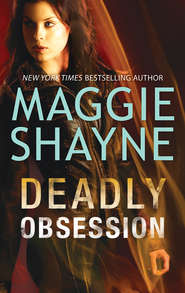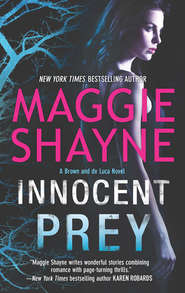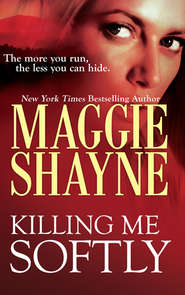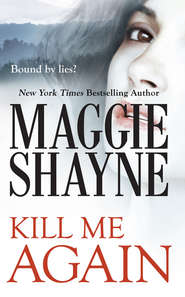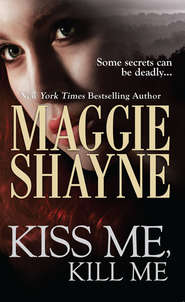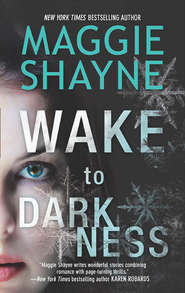По всем вопросам обращайтесь на: info@litportal.ru
(©) 2003-2025.
✖
Twilight Fulfilled
Автор
Год написания книги
2019
Настройки чтения
Размер шрифта
Высота строк
Поля
But she had an assignment, and it wasn’t going to be a pleasant one.
As the elders filed in, all of them having changed into dry clothes, and pink with the flush of a recent meal, Brigit waited, wondering what they would have to say to her.
Rhiannon entered first, wearing one of her signature gowns, floor-length, thigh-high slit, plunging neckline. This one was teal-green, a color Brigit hadn’t seen on her before. It went well with her raven hair. She was far more than an elder vampiress. She was Rianikki, a priestess of Isis, daughter of a pharaoh. She knew about magic and could do things no other vampire could.
Behind her came her beloved Roland de Courtemanche in his old-school tux and black satin cloak. Probably unwise of him to keep wearing something that might as well have been a flashing Vampire Here sign, but that was his call. He’d been a medieval warrior knight, was wise beyond questioning and had a fierce side that he kept very well contained.
Eric Marquand, Roland’s best friend, came next. A nobleman, a physician and a scientist, Eric had nearly been beheaded during the French Revolution. Roland had visited him in his cell on the night before he was slated to meet the guillotine, saving his life and making him over.
Sarafina, the beautiful, fiery Gypsy, came last, skirts and scarves trailing, bangles and earrings jingling as she moved. She was the missing Dante’s aunt, but more like a sister to him. And worry marred her brow.
The four sat at a table, embodying more than four thousand years of living, of wisdom, of knowledge. And yet there were some troubling absences among the elders of their kind. Damien, the first vampire, once known as Gilgamesh. The Prince, who had become known as Dracula down through the ages. They’d struck out separately with their respective mates to try to locate survivors and bring them to safety. But it wasn’t safe out there. Not even for them.
Although these ancient mighty beings who surrounded her now had practically raised her, Brigit saw them through fresh eyes on this night. She felt awe at their presence, their power, and found herself bowing her head slightly before taking her own chair at the long table.
It was Rhiannon who began, with a story that Brigit already knew by heart.
“Utanapishtim, Ziasudra, onetime Priest King of the land of Sumer, was beloved of the gods, and so when they sent the great flood to wipe out mankind, he alone was spared. In return for his loyalty, the gods bestowed upon him the gift of immortality. There was only one caveat—he must never attempt to share the gift with any other human.”
Rhiannon fell silent, her gaze sliding, adoringly but solemnly, to Roland, who nodded once and picked up the tale. “The great king Gilgamesh—the man we know today as Damien—was in deep mourning for his best friend, Enkidu, who was more than a brother to him. Enkidu was like the king’s shadow self—like a twin who is opposite and yet the same,” he said, with a meaningful look straight into her eyes.
Brigit understood.
“King Gilgamesh blamed himself for Enkidu’s death. He wanted only to find a way to restore life to his friend. And so he wandered into the desert in search of the only immortal—the flood survivor. And he found him. The king commanded that Utana share the gift of immortality with him, so that he could share it, in turn, with Enkidu.”
Roland stopped there, turning to Sarafina, who took up the thread. “Utana could not refuse his king, and so he gave him the gift. But despite becoming immortal himself, King Gilgamesh could not recover his friend from the Abode of the Dead. And because Utana had disobeyed the gods, he was cursed. His eternal life was taken from him—but his immortality was not. And later, when he was murdered by an evil one, Utana died but did not die. We know now that his spirit remained, trapped with his ashes, lo these five thousand years.”
Eric took over from Sarafina at her gentle nod. “There came to light a prophecy, a stone tablet from Utana’s time, that told of the destruction of the vampire race and suggested that only by raising Utanapishtim from the dead could it be averted. This prophecy spoke of the twins who were neither vampire nor human but both combined, the two who are like no other and yet opposites, who would save our kind. But parts of the tablet were missing. Broken. Hidden away, so its true meaning was unclear.”
Eric then looked at Brigit, holding her eyes until she knew she was supposed to fill in the rest. She cleared her throat, nodding. “And so the good twin, the one who was born with the gift of healing, found Utana’s ashes and restored life to him. But Utana’s mind was warped from thousands of years of imprisonment, and he turned on his own people, decimating the vampire race he had never intended to create. And those who remain believe it is only the evil twin, who was born with the power of destruction, who can return him to the grave—his prison—and save what few remain of vampire-kind.”
Everyone in the room nodded.
Rhiannon spoke again. “Utana believes that he can only be free of his curse by undoing the wrong he committed so long ago. He thinks he has to wipe us out, so that when he dies again, he will move on to the afterlife, rather than returning to the horror of the living death where he spent more than five thousand years.”
“I know.”
“We know very little about his strengths, his powers,” Rhiannon said. “Except that he can blast a beam of light from his eyes that is much like the explosive beam you yourself can project.”
“And that he can take the powers from others,” Brigit added, with a look toward the closed door, beyond which her brother lingered, somewhere, with their parents, Edge and Amber Lily, and the others. “We know that, because he took J.W.’s healing gift away from him.”
Everyone nodded sadly.
“We don’t know how to kill him in a way that will free his spirit,” Roland said softly. “We only know that the first time he died, he was beheaded and his body cremated, at least according to the tablets. And while it grieves all of us to think we might be condemning him—our own forebear—to return to that nightmarish state, he has left us with no other choice.”
Brigit nodded. “I know.”
“We also know,” Eric said, “that he can sense us, feel us, just as we can detect the presence of one another, and of the Chosen. There’s a bond, a connection. We believe that he is using that bond to follow us, even now.”
Brigit frowned; this was the first she’d heard of that. “What makes you think so?”
Eric rose, crossing the room to take a remote control from a nearby shelf and aiming it toward an elaborately carved, antique-looking cherrywood armoire. The armoire’s doors swung open, revealing a large, state-of-the-art flat-screen TV. Eric thumbed another button to turn it on, and another to activate the DVR and choose a local news broadcast from a few hours earlier.
Captioned “Bangor, Maine,” with today’s date beside it, footage panning the interior of a demolished restaurant played out on the screen. Then the scene switched to show a S.W.A.T. team surrounding a delivery truck on a street that had been closed down, as a grim-voiced reporter explained, “An apparently mentally disturbed man trashed Succulence, a four-star restaurant in Bangor, this evening. The assailant took only food, but injured several people and caused enormous damage to the business. Police believe they now have this obviously dangerous man cornered in the back of a delivery truck a few blocks away from the restaurant. This is live coverage of the S.W.A.T. unit, as they slowly close in on the truck and—”
“No,” Brigit said, getting to her feet, talking to the TV as if it would help. “No, no, get them out of there!”
A hand fell on her shoulder, and Roland said, “This is a recording, child. It’s already happened.”
The cops took cover and took aim, as someone lifted a bullhorn to order the man to come out with his hands up.
Brigit watched as the truck doors opened and Utana appeared. She’d seen the man before, but never looking like he did then. His makeshift garment—a toga made from a bed sheet—was torn, wet and filthy, his long black hair hanging in dripping straggles, his face shadowed by a wild-looking beard, his eyes dangerous.
He looked like she imagined Moses had, after his encounter on Mount Sinai.
And then she could see nothing but the beam that emanated from his eyes just before the picture went to snow. The screen flicked back to the somber, too-tanned face of an anchor at the news desk. “Our camera crew survived, and though they got additional footage, we can’t show you more, out of respect for the families of the seventeen officers who were wiped out by whatever unknown weapon this madman was wielding. Frankly, it’s just too gruesome for television. The man is still at large, and the National Guard has been called in to help with the hunt.”
Brigit stared at the screen long after Eric had shut off the television.
“You have to stop him, Brigit.”
She nodded. “And what are all of you going to do? You can’t stay here. He’s too close. He won’t stop until he finds you.”
“We’re moving,” Roland said. “The plantation in Virginia is isolated enough in the Blue Ridge Mountains that it should be safe … at least for a little while. We don’t want to go too far until we’ve eliminated this threat and gathered as many of our own together as we can find. After that, we’ll likely be forced to leave the country for a location more remote and isolated than anything the U.S. has to offer in this day and age. We’re exploring several options now. But that’s not for you to worry about.”
“You have only one task to focus on,” Rhiannon said. “Find the first immortal. Find him … and kill him.”
Downtown Bangor, Maine
Utana had sensed the soldiers surrounding his temporary haven. All he had wanted was a meal, and a dry place in which to eat it. And he’d found both, though he had been surprised by the resistance of the food vendors when it came to sharing their bounty. Taking it by force had seemed ridiculous. Did they not realize he was a king? He had left the establishment in a mess, but it would be easily restored. He’d broken a table, perhaps some of the strange pottery food-vessels, as well. He’d had to use force on some of the humans. The mortals. That was what James of the Vahmpeers had called the ordinary ones. Mortals. Utana had intended them no harm, had used no more force than was necessary.
Well, perhaps a bit more than was necessary. He’d been agitated. And half-starved.
But then he’d found a shelter and filled his belly with the food, and he had never eaten its equal. Never. It was luscious, fit for the gods. He’d found a comfortable spot in the corner of the box that contained him, and he’d curled up, intent on napping, despite the fact that his clothes were still wet and he was shivering with cold.
And then, just as he’d been about to nod off into the world of dream journeys, he’d felt them all around him. He’d felt their fear of him, their hatred and their intentions. His punishment for taking a meal without compensation was to be death, it seemed. They carried weapons, he sensed it. And he knew by the vibrations in the very ether between them and himself that those weapons would be used on him without hesitation.
Yes. There was no question. He felt it. Violence. Barely contained, crouching like a tiger about to spring.
And so he had no choice. He wanted nothing from these humans. He meant them no harm whatsoever. It was his own race he must wipe from existence, not theirs. All he intended was to eat, to sleep and to be on his way. This devastation he was about to unleash was entirely their own doing.
Sighing in resolution, and with no small regret, he had opened the doors of his haven and meted out justice. He’d focused the beam from his eyes on the men who leveled their weapons at him. The light shot forth, a blue-white stream that widened, opening like the wings of a great, deadly bird, so that all of them were caught in it. The soldiers went still as the beam hit them. Their eyes widened as their bodies began to vibrate, frozen within the grasp of his power and unable to break free. And then, one by one, they exploded.
When it was over, an eerie calm fell over everything around him. The silent stillness of death. It was like no other emanation. When the souls fled the bodies of the living, especially in such massive numbers all at once, they left a vacuum behind. A space devoid of sense, of sound, almost of air.
Utana stepped down from the box-on-wheels, and he walked amid the remains. True carnage, this. Pieces of the humans littered the stone like ground, and hung from the motorized vehicles and the tall, light-emitting poles, and from the lines that seemed to be strung everywhere in this world. It was a terrible waste of life, and all for nothing.
As he looked at the death and mutilation around him, he thought of the healing power he had taken from James of the Vahmpeers. He had not yet attempted to use it, but he had no illusions that it would be effective on bits and pieces of men. He would first have to sort them, leaving none out, nor mixing any together. Such a task would be impossible, and would take days—weeks, perhaps—even to attempt. No, it was of no use. Were they not meant to die this day, they would not have placed themselves in his path. The higher being knew far more than did the earthly one. Their fate had been sealed; there was no undoing it.






